INTERNACIONAL
Senate GOP ready to go nuclear after Schumer’s ‘political extortion’ of nominees

NEWYou can now listen to Fox News articles!
Senate Republicans are mulling whether to go nuclear after negotiations with Senate Democrats to ram through President Donald Trump’s nominees fell apart over the weekend.
The path to confirming dozens of Trump’s outstanding nominees was destroyed when the president accused Senate Minority Leader Chuck Schumer, D-N.Y., of «political extortion,» and charged that the Democratic leader’s asking price for nominees was too high.
TRUMP TELLS SCHUMER TO ‘GO TO HELL’ OVER SENATE NOMINEE DEAL FUNDING DEMANDS AFTER NEGOTIATIONS COLLAPSE
Senate Republicans are mulling whether to go nuclear after negotiations with Senate Democrats to ram through President Donald Trump’s nominees fell apart over the weekend. (Anna Moneymaker/Getty Images; Al Drago/Bloomberg via Getty Images)
Now, lawmakers have left Washington without a deal to bundle dozens of nominees that made it through committee with bipartisan support, and a change to how the Senate handles the confirmation process is on the horizon.
Senate Majority Whip John Barrasso, R-Wyo., berated Schumer and Senate Democrats for their «unprecedented» blocks of the president’s nominees, and noted that every pick had been filibustered save for Secretary of State Marco Rubio, who glided through the Senate earlier this year.
«We have been working through the list, but there is still a large backlog because of the unprecedented filibuster by the Democrats of every nominee,» Barrasso said. «And if they don’t change their behavior, we’re going to have to change how things are done here, because a president needs to have his or her team in place.»
DEMS DIG IN, TRUMP DEMANDS ALL: NOMINEE FIGHT BOILS OVER IN SENATE AS GOP LOOKS FOR A DEAL
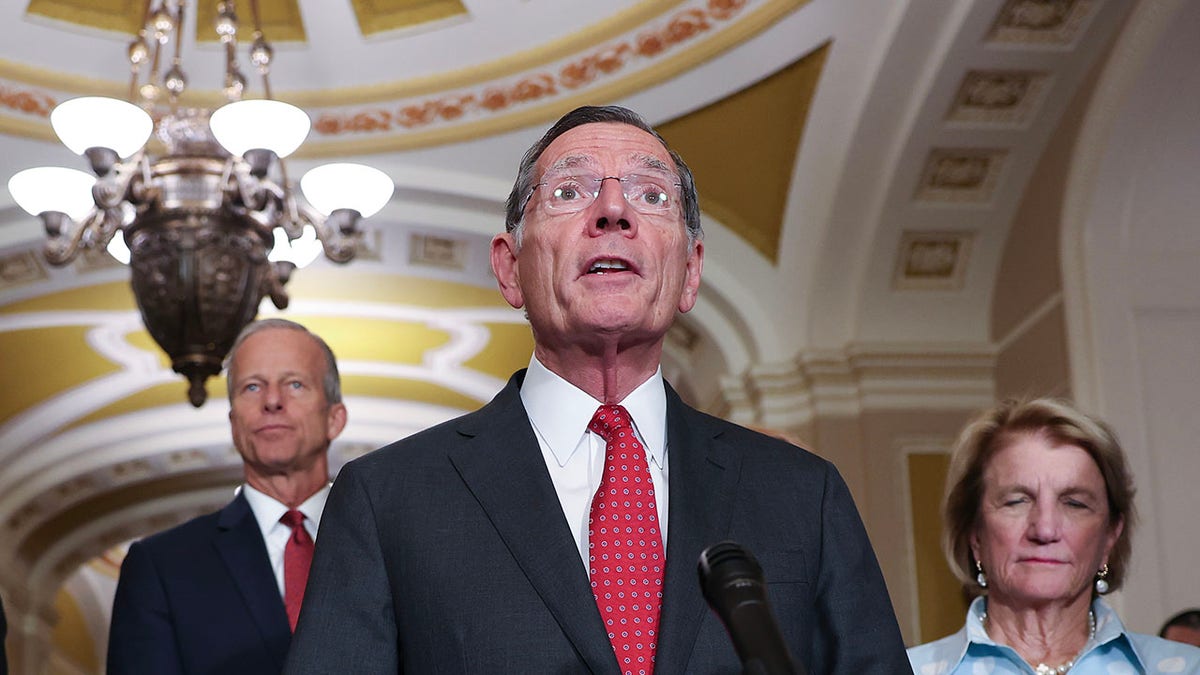
Sen. John Barrasso speaks to reporters during the weekly luncheons on Capitol Hill on June 24, 2025. (Tasos Katopodis/Getty Images)
Under normal circumstances, changing the rules in the Senate would require 67 votes, meaning that Senate Democrats would have to be on board with a change. However, there is a path that lawmakers refer to as the nuclear option, which allows for rules changes to only need a simple majority.
There is the political will among Republicans to change the rules, but doing so would open the door for Senate Democrats to do the same when they get into power once more.
«I think that way is going to happen anyways, because of what Schumer has done. He’s forced this, and it’s ridiculous that he’s doing this,» Sen. Markwayne Mullin, R-Okla., said. «And so, whatever, we’re at this point, and we’ll do, you know what they say, every action requires an equal [reaction], and that’s what we’re at right now.»
Some of the options on the table include shortening the debate time for nominees, getting rid of procedural votes for some lower-level nominees, grouping certain civilian nominees «en bloc» – something that is already done for military nominees – and, at the committee level, deciding whether to lower the number of nominees subject to the confirmation process.
GRIDLOCK CRUMBLES AS SENATE ADVANCES SPENDING BILLS IN RACE AGAINST SHUTDOWN
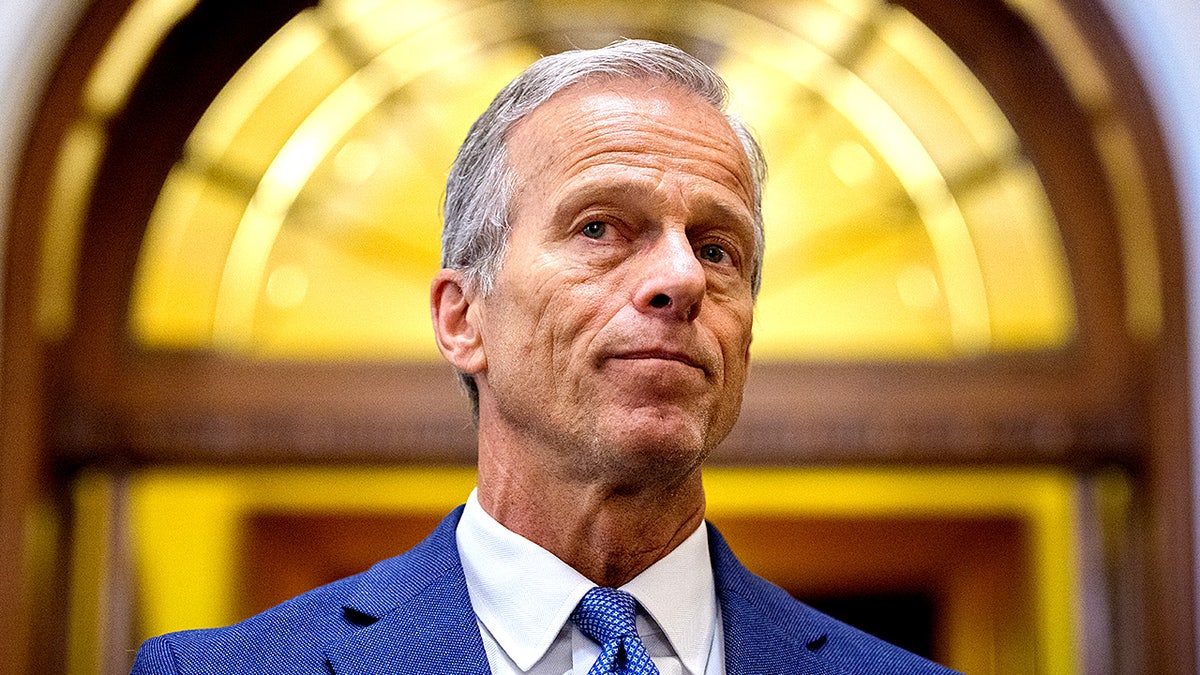
Senate Majority Leader John Thune pauses while speaking to reporters at the U.S. Capitol on July 1, 2025. (Getty Images/Andrwe Harnik)
Currently, over 1,200 positions go through Senate confirmation. Senate Republicans have been able to confirm over 130 of Trump’s picks so far, but had a loftier goal of doing at least 60 more before leaving town until September.
And there are over 140 nominees still pending on the Senate’s calendar.
«I think they’re desperately in need of change,» Senate Majority Leader John Thune, R-S.D., told reporters. «I think that the last six months have demonstrated that this process, nominations, is broken. And so I expect there will be some good robust conversations about that.»
As to when lawmakers will try to run with a rules change is still in the air. The Senate is gone from Washington until early September and will return to a looming deadline to avert a partial government shutdown.
Before leaving town, the Senate did advance a trio of spending bills – a first in the upper chamber since 2018 – but those same bills are unlikely to pass muster in the House, given that they spend at higher levels than the ones greenlit by the House GOP.
Ramming a rules change through without Democrats could also come at a price for government funding negotiations. Schumer said a possible rules change would be a «huge mistake» for Republicans to do on their own.
CLICK HERE TO GET THE FOX NEWS APP
«Because when they go at it alone, they screw up for the American people and for themselves,» he said.
When asked if there were any possible rule changes that he and Senate Democrats could agree to, Schumer said, «We should be working together on legislation to get things done for the American people.»
«That’s the way to go, not changing the rules, because when they change the rules, they say, ‘Only we’re going to decide what’s good for the American people,’ and every time they do that, the American people lose,» Schumer said.
Still, Republicans were unhappy with the way negotiations devolved after days of back and forth.
«We actually, we wanted a deal,» Mullin said. «And these people deserve to be put in position… they’re going to say that we’re trying to do a nuclear option. The fact is, they – Schumer – went nuclear a long time.»
politics,senate,donald trump,chuck schumer
INTERNACIONAL
El enigma de los 11 días que Agatha Christie estuvo desaparecida: venganza, traición y una llamativa identidad falsa

En diciembre de 1926, la escritora británica Agatha Christie se desvaneció durante 11 días en lo que se convertiría en uno de los misterios más intrigantes del siglo XX. A los 36 años, con seis novelas ya publicadas, Christie abandonó su hogar en Sunningdale la noche del 3 de diciembre llevando únicamente una pequeña maleta, una fotografía de su hija y dinero en efectivo. Su automóvil Morris Cowley fue hallado al día siguiente en Surrey Downs, con las ruedas delanteras colgando sobre el borde de un precipicio, pero sin rastro de la novelista.
La desaparición desató una búsqueda masiva que movilizó entre 10.000 y 15.000 voluntarios, según reportó The New York Times. Los investigadores emplearon sabuesos entrenados, terriers Airedale y perros policía alsacianos en una operación que se transformó rápidamente en un circo mediático mundial. Los titulares especulaban sobre suicidio y asesinato, mientras la prensa internacional seguía cada desarrollo del caso.
El 15 de diciembre, Christie fue encontrada en el Swan Hydropathic Hotel de Harrogate, Yorkshire, registrada bajo el nombre “Teresa Neele”. Aparentemente sufría de amnesia y fue hallada leyendo un diario donde su propia desaparición ocupaba la primera plana. Su esposo, el coronel Archibald Christie, explicó a los medios que la escritora padecía un trastorno nervioso y pérdida total de memoria.
Una de las hipótesis más extendidas sugiere que Christie orquestó su desaparición como venganza contra su esposo infiel. La pareja llevaba 12 años de matrimonio y tenía una hija de siete años, Rosalind. Antes de desaparecer, la autora había dejado una nota que Archie admitió haber leído y posteriormente destruido.
El elemento revelador surgió con el tiempo: Nancy Neele no era solo el apellido que Christie utilizó en el hotel, sino también el de la amante de su marido. Durante el fin de semana de la desaparición, Archie había asistido a una fiesta de compromiso con Neele, información que omitió a los investigadores. De acuerdo con The New York Times, la misma mañana del 3 de diciembre, la pareja había discutido sobre la aventura extramarital, y el coronel había solicitado el divorcio para casarse con su nueva pareja.

Esta teoría plantea que Christie sincronizó perfectamente su desaparición para arruinar la celebración de compromiso de su esposo, forzándolo a regresar mientras se convertía en el principal sospechoso de su posible asesinato.
La biógrafa Laura Thompson exploró personalmente el lugar donde fue abandonado el vehículo y concluyó que Christie probablemente planeó quitarse la vida. Thompson describió el sitio como “un lugar espeluznante e inquietante, con agua por todas partes, en medio de la nada”, según detalló The Independent. A pesar de los daños visibles, el automóvil conservaba combustible suficiente para continuar circulando.
En 1926, Christie había experimentado múltiples traumas emocionales: la muerte de su madre y el alejamiento de su mejor amiga Charlotte. “Por primera vez en mi vida me encontraba realmente enferma”, escribió la autora en su autobiografía. En una entrevista de 1928, describió el momento del accidente: “El coche golpeó algo con un tirón y frenó bruscamente. Salí despedida contra el volante y mi cabeza chocó contra algo. Hasta ese momento yo era la Sra. Christie”.
La escritora admitió haber salido de casa “con intención de hacer algo desesperado”, aunque negó categóricamente intentos suicidas. Esta distinción resultaba crucial: en la época, el suicidio constituía tanto un delito como un pecado que podría haberle costado la custodia de su hija en un proceso de divorcio.

La historiadora Lucy Worsley propone una explicación médica para el episodio. Christie habría experimentado un “estado de fuga disociativa”, una condición psiquiátrica caracterizada por amnesia temporal derivada de trauma emocional intenso. Esta teoría, reportada por The Independent, explica cómo los afectados pueden deambular con aparente normalidad mientras sufren desconexión interna profunda.
Durante su estancia en Harrogate, Christie socializaba, bailaba charleston, cantaba y pedía el desayuno en la cama, comportándose como una huésped procedente de Ciudad del Cabo, Sudáfrica. Aproximadamente el 85% de quienes padecen trastornos disociativos experimentan dolores de cabeza intensos, síntoma que Christie había mencionado en correspondencia previa: “Me estalla la cabeza”.
Worsley rechaza las teorías de venganza o publicidad, argumentando que el uso del apellido Neele no constituía una estrategia calculada sino manifestación de una condición mental seria. “Eso no es incriminar a tu esposo infiel por asesinato, eso es vivir con una condición de salud mental realmente grave”, declaró la historiadora.

Una hipótesis alternativa sugiere que la desaparición formó parte de un experimento literario o maniobra publicitaria. Durante los 11 días de búsqueda, Archie Christie ofreció una entrevista donde explicó: “Mi esposa había discutido la posibilidad de desaparecer a voluntad (…) la ingeniería de una desaparición había estado rondando por su mente, probablemente con el propósito de su trabajo”.
Christie acababa de publicar “El asesinato de Roger Ackroyd”, su sexta novela, famosa por revelar al narrador como asesino. Si la desaparición fue una estrategia de marketing, funcionó espectacularmente: los diarios comenzaron a serializar sus novelas junto a los reportajes del caso, duplicando inmediatamente las ventas de sus libros.

La transformación de Christie en “autor-celebridad” se consolidó tras este episodio. En 1930 firmó un lucrativo contrato para seis novelas, abandonando los modestos pagos de pequeñas editoriales. Según Worsley, aunque la experiencia fue “accidental y profundamente desagradable”, se convirtió en “uno de los pilares de su enorme éxito”.
Un siglo después de los hechos, el enigma de los 11 días perdidos de Agatha Christie continúa desafiando a historiadores y biógrafos. La propia autora mantuvo silencio sobre el episodio durante décadas, creando un misterio personal tan fascinante como cualquiera de sus novelas detectivescas.
Entertainment and Lifestyle,Europe
INTERNACIONAL
Senate Democrats are feverishly recruiting top candidates to win back majority in 2026 midterms

NEWYou can now listen to Fox News articles!
As they mount their uphill effort to win back the Senate majority in next year’s midterm elections, Democrats feel that they’re on a roll.
Late last month, they landed their biggest recruit to date, when former two-term Democratic Gov. Roy Cooper of North Carolina declared his candidacy in the 2026 race to succeed retiring Republican Sen. Thom Tillis.
Democrats view the open Senate seat in the crucial southeastern battleground state as a top pick-up opportunity next year as they try to win back control of the Senate, which the Republicans currently hold with a 53-47 majority.
«It’s hard to overstate the importance of getting Gov. Cooper to run for the Senate in North Carolina, and already we are seeing a potential for a ripple effect,» longtime Democratic strategist Chris Moyer told Fox News Digital.
THIS REPUBLICAN JUST JUMPED INTO BATTLEGROUND GEORGIA’S HIGH-PROFILE SENATE RACE
Then-Gov. Roy Cooper, a Democrat from North Carolina, speaks with reporters on Sept. 10, 2024, in Philadelphia, Pennsylvania. (Paul Steinhauser – Fox News )
Moyer, a veteran campaign communicator, said that Cooper recruitment is «giving more faith to potential candidates who are questioning whether there’s a chance for a Democratic majority in the Senate next year.»
Senate Minority Leader Chuck Schumer and Democratic Senatorial Campaign Committee (DSCC) Chair Sen. Kirsten Gillibrand, after landing Cooper, said he «is a formidable candidate who will flip North Carolina’s Senate seat.»
Top Democrats now have their eyes on former Sen. Sherrod Brown of Ohio, who lost last year’s re-election bid in a onetime top swing state that’s become reliably red over the past decade.
WHAT A TOP POLITICAL HANDICAPPER SAID ABOUT THE DEMOCRATS’ CHANCES TO WIN BACK SENATE IN 2026
Schumer, the top Democrat in the Senate, trekked to Ohio this summer in hopes of convincing Brown to take on Republican Sen. Jon Husted, Fox News confirmed.
Brown, who served over three decades in the House and later the Senate, is viewed by Democrats as the only candidate who could potentially topple Husted, who was named at the beginning of this year to fill the seat left vacant when then-Sen. JD Vance stepped down to become vice president.
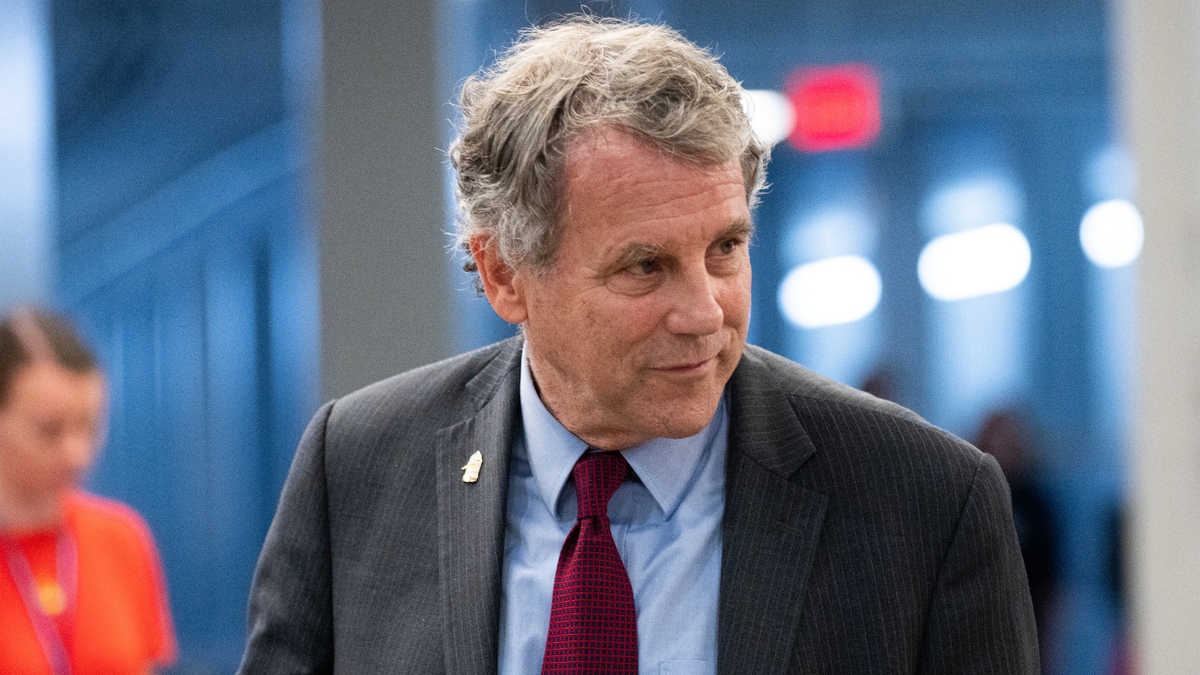
Former Democratic Sen. Sherrod Brown of Ohio is seriously considering a 2026 bid to return to the Senate. (Bill Clark/CQ-Roll Call, Inc via Getty Images)
Democrats landed the candidate they were hoping for in swing state New Hampshire in the race to succeed retiring longtime Democratic Sen. Jeanne Shaheen.
Four-term Rep. Chris Pappas’ announcement in early April that he would run to succeed Shaheen has cleared the Democratic primary field, as of now, of any potential rivals for the party’s Senate nomination.
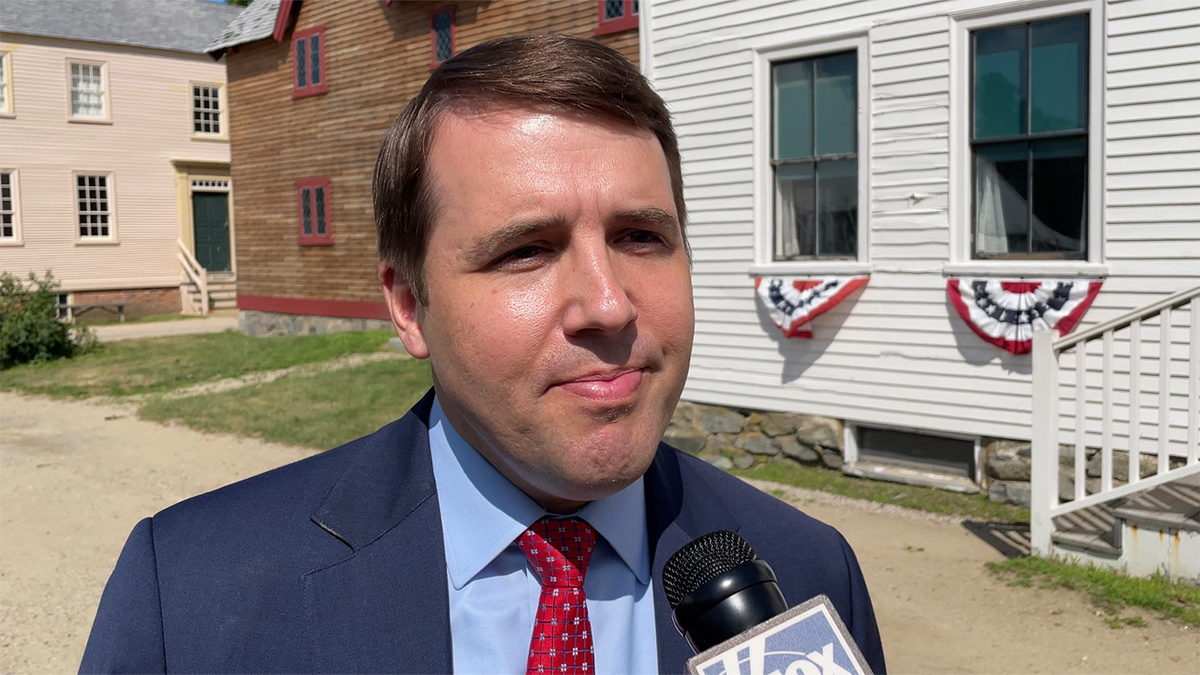
Democratic Senate candidate in New Hampshire Rep. Chris Pappas is interviewed by Fox News Digital on July 4, 2025, in Portsmouth, N.H. (Paul Steinhauser – Fox News)
Meanwhile, a Republican primary in the state – where the GOP hasn’t won a Senate race in 15 years – is heating up between former Sen. Scott Brown and state Sen. Dan Innis, with the possibility of more candidates entering the race.
In battleground Georgia, which President Donald Trump narrowly carried in last year’s White House race, Republicans view first-term Sen. Jon Ossoff as the most vulnerable Democrat incumbent up for re-election next year.
But Ossoff is off to a very hot fundraising start, and a GOP primary between Reps. Mike Collins and Buddy Carter, and former college and professional football coach Derek Dooley, is starting to turn combustible.
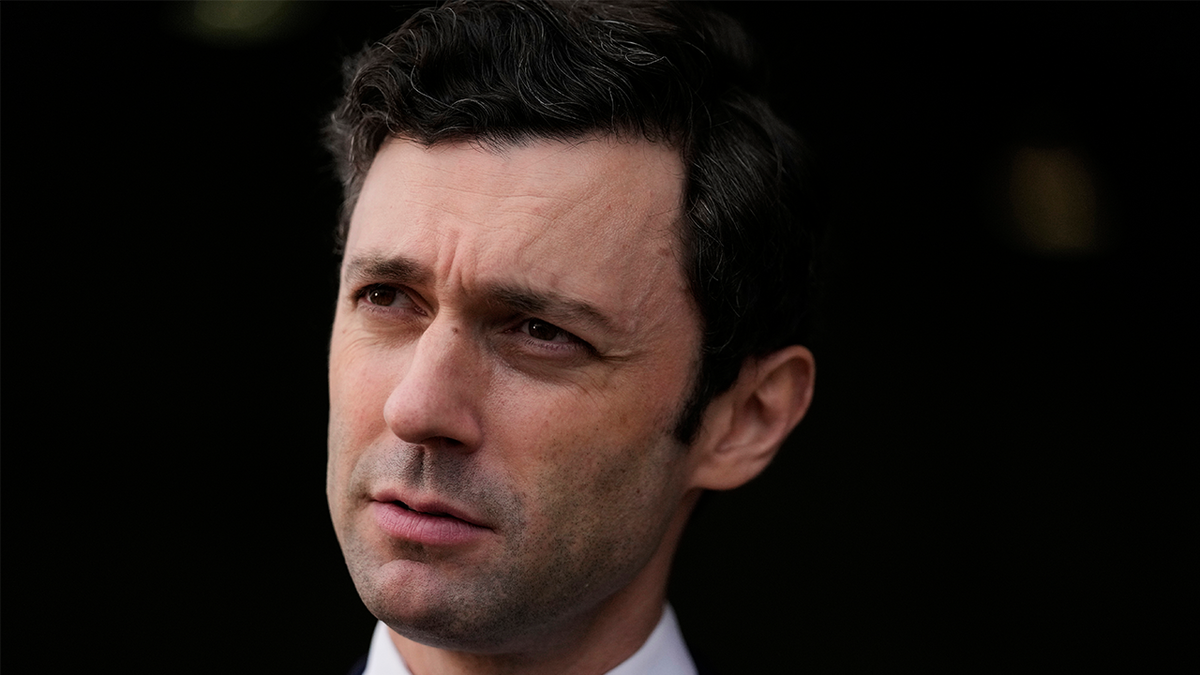
Republicans view Sen. Jon Ossoff as the most vulnerable Democrat running for re-election in the 2026 midterm elections. (AP)
Of potential concern for the Democrats is Michigan, where the dynamics appear to be the opposite of Georgia, in the race to succeed retiring Democratic Sen. Gary Peters.
Former Rep. Mike Rogers, the 2024 GOP Senate nominee who narrowly lost last year’s race, appears to have cleared the Republican, thanks in great part to Trump’s endorsement and likely arm twisting by the president’s political team.
Democrats, meanwhile, have a very competitive primary on their hands. The primary race includes three well-known Democrats: Rep. Haley Stevens, state Sen. Mallory McMorrow, and former gubernatorial candidate Abdul El-Sayed, who enjoys the backing of progressive champion Sen. Bernie Sanders of Vermont.
And popular Detroit Mayor Mike Duggan is running for the Senate as an independent, which could potentially hurt Democrats in the general election.
While Texas has long been a reliable red state, and conservative firebrand Sen. Ted Cruz comfortably won re-election last year, Democrats are optimistic about their 2026 chances to potentially flip a red seat to blue.
That’s because longtime GOP Sen. John Cornyn is facing a serious primary challenge from Texas Attorney General Ken Paxton, a MAGA world rockstar.
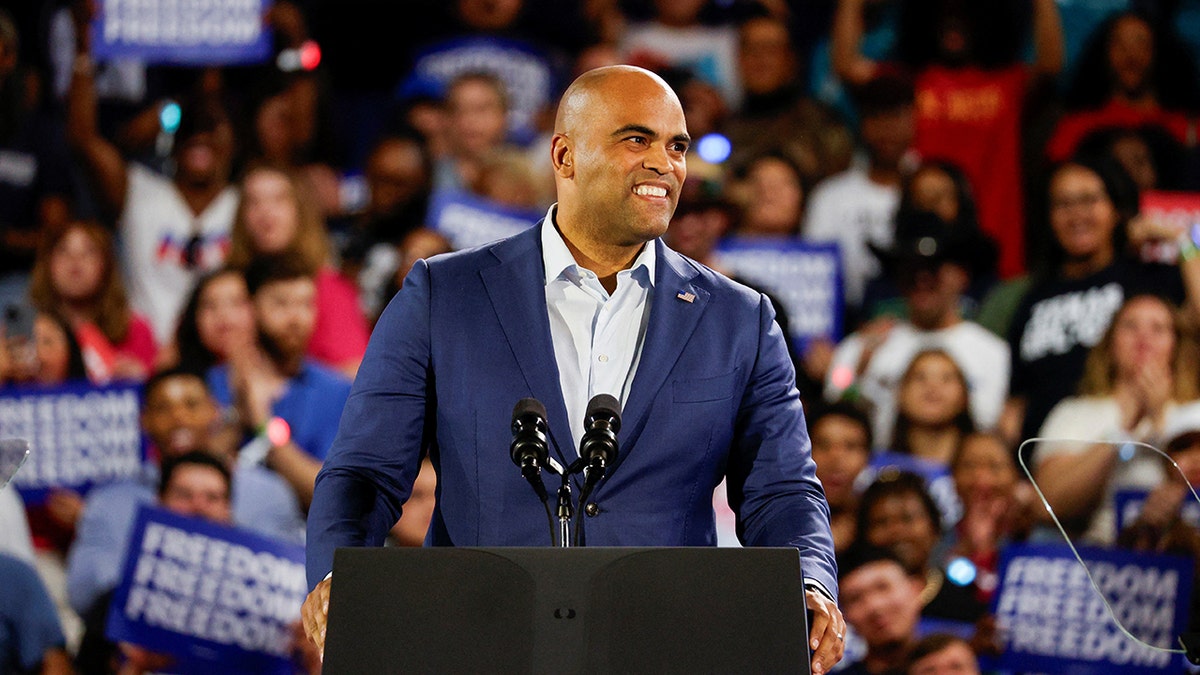
Former Rep. Colin Allred of Texas, seen on the campaign trail last October, is running for a second straight election cycle for the Senate. (Reuters/Marco Bello)
Paxton has long been surrounded by scandals, and is now dealing with a headline-grabbing divorce with his wife, state Sen. Angela Paxtom. And Democrats believe if Paxton topples Cornyn in next March’s GOP primary, he’ll be toxic in the general election.
But Democrats could have a competitive primary in Texas as well.
Former Rep. Colin Allred, who lost to Cruz last November, launched a second straight campaign earlier this year.
Former Rep. Beto O’Rourke, who came close to ousting Cruz in the state’s 20218 Senate election before unsuccessfully running for the 2020 Democratic presidential nomination and losing the 2022 Texas gubernatorial race to GOP Gov. Greg Abbott, is taking a hard look at a 2026 Senate run.
State Rep. James Talarico, who grabbed national attention recently for his appearance with popular podcaster Joe Rogan, and Rep. Joaquin Castro, are also mulling bids.
CLICK HERE TO GET THE FOX NEWS APP
Democrats also feel they may have a shot in Iowa – a onetime swing state that’s become firmly red in recent election cycles – if Republican Sen. Joni Ernst decides against seeking a third term in the Senate.
But they’ll likely have a much better chance of flipping a GOP-held seat in blue state Maine if longtime Republican incumbent Sen. Susan Collins decides against seeking re-election.
democrats senate,senate,midterm elections,elections,donald trump,democratic party,republicans elections
INTERNACIONAL
Witkoff meets with Putin over war in Ukraine, no ceasefire agreements announced

NEWYou can now listen to Fox News articles!
White House envoy Steve Witkoff landed in Russia on Wednesday for his fifth visit with Russian President Vladimir Putin as President Donald Trump looks to force a peace deal and bring an end to the three-and-a-half-year war in Ukraine.
Little seems to have been accomplished from the three-hour meeting in the way of securing a peace deal, or even circumventing the threatened sanctions by Trump that Putin now stares down, though according to Russian foreign policy advisor Yuri Ushakov, the meeting was described as «useful and constructive.»
Ushakov said Putin «received some signals from Trump» and «sent some signals,» but he did not elaborate on any specifics.
Russian President Vladimir Putin (L) meets with US President’s Special Envoy Steve Witkoff (R) at Kremlin Palace in Moscow, Russia on August 6, 2025. (Kremlin Press Office / Handout/Anadolu via Getty Images)
WITKOFF SCRAMBLES FOR PEACE DEAL WITH RUSSIA AS SANCTIONS LOOM TARGETING INDIA, CHINA
The advisor also told reporters that Putin and Witkoff had discussed developing the «strategic partnership» between the U.S. and Russia but did not elaborate how. The comment came after Witkoff was spotted earlier in the day taking a walk near the Kremlin with Kirill Dmitriev, the Russian president’s envoy for investment and economic cooperation.
Witkoff and Putin met shortly before noon in Moscow, according to the timestamp released by the Kremlin which accompanied an image of Putin and Witkoff smiling and shaking hands as Russian foreign policy advisor Yuri Ushakov looked on.
Witkoff’s team did not respond to Fox News Digital’s questions on what the envoy was hoping to accomplish in his meeting with Putin, though some reporting this week suggested he may look to secure a moratorium on air strikes.

A police officer at the site of a Russian air strike that hit a residential building in Kyiv, Ukraine, on Thursday, July 10, 2025. (Andrew Kravchenko/Bloomberg via Getty Images)
Witkoff traveled to Moscow in a last-ditch effort to get Putin to capitulate to Trump’s and Western calls for an end to the war, though the Kremlin chief was not expected to make great concessions in ending his war ambitions ahead of the trip.
In mid-July, while seated next to NATO Secretary General Mark Rutte, Trump promised to enforce «very severe» tariffs on Russia if Putin does not enter into a deal with Ukrainian President Volodymyr Zelenskyy within 50 days.
«Tariffs at about 100%, you’d call them secondary tariffs,» he had said, implying that nations who trade with Russia will see 100% tariffs slapped on them when trading with the U.S.
He then pushed the date up to within 10 days of July 29, forcing the new deadline for Friday.
But on Tuesday Trump walked back his 100% tariff threat amid tough trade talks with India and China, and said, «I never said a percentage.»
«We’ll see what happens over the next fairly short period of time,» he added in response to questions from reporters. «We have a meeting with Russia tomorrow. We’re going to see what happens.

President Donald Trump, right, and Mark Rutte, secretary general of the North Atlantic Treaty Organization (NATO), shake hands during a meeting in the Oval Office of the White House in Washington, D.C., on Monday, July 14, 2025. (Yuri Gripas/Abaca/Bloomberg via Getty Images)
CLICK HERE TO GET THE FOX NEWS APP
«We’ll make that determination at that time,» he added.
The tariffs would most drastically target China and India, which are the largest purchasers of Russian oil, though high tariffs on those nations, both of which are major traders with the U.S., would also mean higher prices for the American consumer.
russia,vladimir putin,ukraine,donald trump,world

 CHIMENTOS17 horas ago
CHIMENTOS17 horas agoMalas noticias para Wanda Nara: por qué la bajaron misteriosamente de MasterChef: «No va a salir este año»

 SOCIEDAD2 días ago
SOCIEDAD2 días agoHay alerta amarilla por tormentas y frío extremo para este lunes 4 de agosto: las provincias afectadas

 POLITICA2 días ago
POLITICA2 días agoMilei afirmó que la elección en la provincia de Buenos Aires “podría significar el fin del kirchnerismo”



































